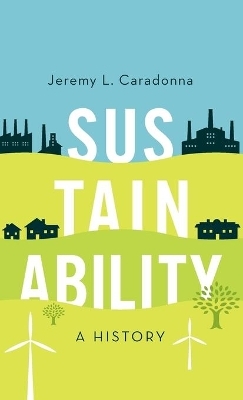
Sustainability
A History
Seiten
2014
Oxford University Press Inc (Verlag)
978-0-19-937240-9 (ISBN)
Oxford University Press Inc (Verlag)
978-0-19-937240-9 (ISBN)
An engaging primer of the history of the sustainability movement from the 1600s to the present day, illuminating how sustainability evolved from a relatively marginal idea to the centerpiece of international accords, a top priority for governments and non-profit organizations, and a philosophy of hope and resilience with widespread appeal.
The word is nearly ubiquitous: at the grocery store we shop for "sustainable foods" that were produced from "sustainable agriculture"; groups ranging from small advocacy organizations to city and state governments to the United Nations tout "sustainable development" as a strategy for local and global stability; and woe betide the city-dweller who doesn't aim for a "sustainable lifestyle." Seeming to have come out of nowhere to dominate the discussion-from permaculture to renewable energy to the local food movement-the ideas that underlie and define sustainability can be traced back several centuries.
In this illuminating and fascinating primer, Jeremy L. Caradonna does just that, approaching sustainability from a historical perspective and revealing the conditions that gave it shape. Locating the underpinnings of the movement as far back as the 1660s, Caradonna considers the origins of sustainability across many fields throughout Europe and North America. Taking us from the emergence of thoughts guiding sustainable yield forestry in the late 17th and 18th centuries, through the challenges of the Industrial Revolution, the birth of the environmental movement, and the emergence of a concrete effort to promote a balanced approach to development in the latter half of the 20th century, he shows that while sustainability draws upon ideas of social justice, ecological economics, and environmental conservation, it is more than the sum of its parts and blends these ideas together into a dynamic philosophy.
Caradonna's book broadens our understanding of what "sustainability" means, revealing how it progressed from a relatively marginal concept to an ideal that shapes everything from individual lifestyles, government and corporate strategies, and even national and international policy. For anyone seeking understand the history of those striving to make the world a better place to live, here's a place to start.
The word is nearly ubiquitous: at the grocery store we shop for "sustainable foods" that were produced from "sustainable agriculture"; groups ranging from small advocacy organizations to city and state governments to the United Nations tout "sustainable development" as a strategy for local and global stability; and woe betide the city-dweller who doesn't aim for a "sustainable lifestyle." Seeming to have come out of nowhere to dominate the discussion-from permaculture to renewable energy to the local food movement-the ideas that underlie and define sustainability can be traced back several centuries.
In this illuminating and fascinating primer, Jeremy L. Caradonna does just that, approaching sustainability from a historical perspective and revealing the conditions that gave it shape. Locating the underpinnings of the movement as far back as the 1660s, Caradonna considers the origins of sustainability across many fields throughout Europe and North America. Taking us from the emergence of thoughts guiding sustainable yield forestry in the late 17th and 18th centuries, through the challenges of the Industrial Revolution, the birth of the environmental movement, and the emergence of a concrete effort to promote a balanced approach to development in the latter half of the 20th century, he shows that while sustainability draws upon ideas of social justice, ecological economics, and environmental conservation, it is more than the sum of its parts and blends these ideas together into a dynamic philosophy.
Caradonna's book broadens our understanding of what "sustainability" means, revealing how it progressed from a relatively marginal concept to an ideal that shapes everything from individual lifestyles, government and corporate strategies, and even national and international policy. For anyone seeking understand the history of those striving to make the world a better place to live, here's a place to start.
Jeremy L. Caradonna is Associate Professor of History at the University of Alberta. He is the author of The Enlightenment in Practice.
Introduction ; 1. Loath This Growth: Sources of Sustainability in the Early Modern World ; 2. The Industrial Revolution and Its Discontents ; 3. Eco-Warriors: The Environmental Movement and the Growth of Ecological Wisdom, 1960s-1970s ; 4. Eco-Nomics ; 5. From Concept to Movement ; 6. Sustainability Today: 2000 - Present ; 7. The Future: 10 Challenges for Sustainability
| Zusatzinfo | 5 b/w |
|---|---|
| Verlagsort | New York |
| Sprache | englisch |
| Maße | 211 x 142 mm |
| Gewicht | 476 g |
| Themenwelt | Geisteswissenschaften ► Geschichte ► Geschichtstheorie / Historik |
| Geschichte ► Teilgebiete der Geschichte ► Kulturgeschichte | |
| Geschichte ► Teilgebiete der Geschichte ► Wirtschaftsgeschichte | |
| Naturwissenschaften ► Biologie ► Ökologie / Naturschutz | |
| Sozialwissenschaften ► Politik / Verwaltung ► Staat / Verwaltung | |
| Technik ► Umwelttechnik / Biotechnologie | |
| Wirtschaft | |
| ISBN-10 | 0-19-937240-3 / 0199372403 |
| ISBN-13 | 978-0-19-937240-9 / 9780199372409 |
| Zustand | Neuware |
| Haben Sie eine Frage zum Produkt? |
Mehr entdecken
aus dem Bereich
aus dem Bereich
der stille Abschied vom bäuerlichen Leben in Deutschland
Buch | Hardcover (2023)
C.H.Beck (Verlag)
23,00 €
vom Mittelalter bis zur Gegenwart
Buch | Softcover (2024)
C.H.Beck (Verlag)
12,00 €
eine Geschichte der Welt in 99 Obsessionen
Buch | Hardcover (2023)
Klett-Cotta (Verlag)
22,00 €


